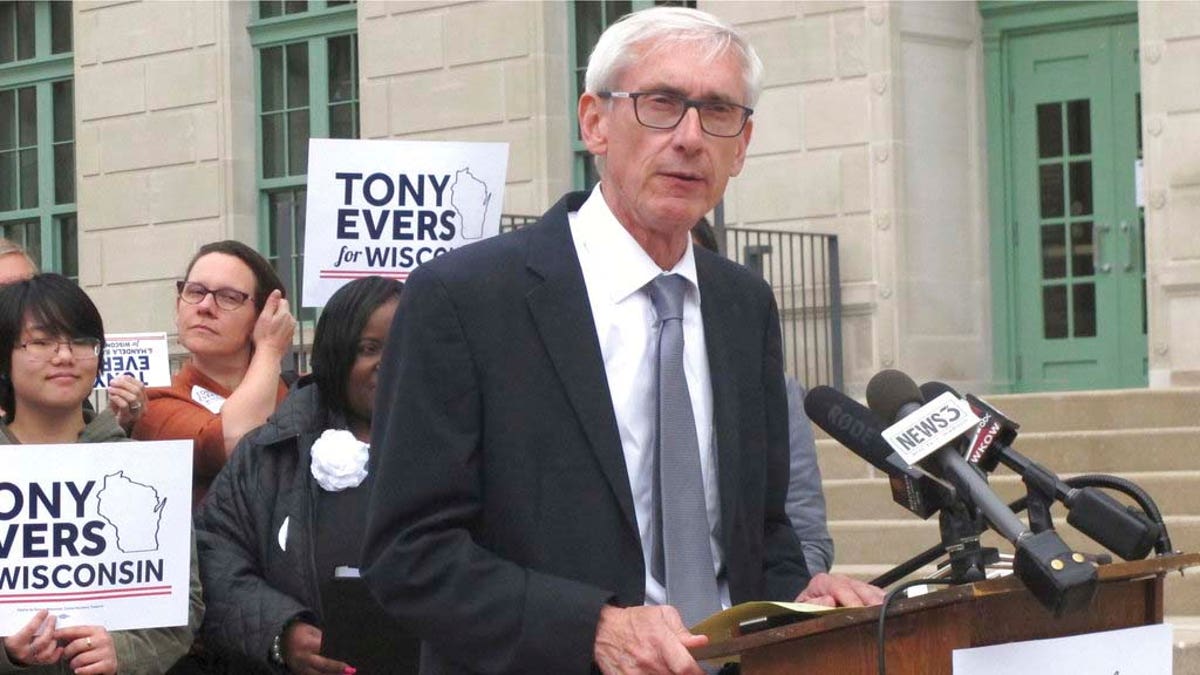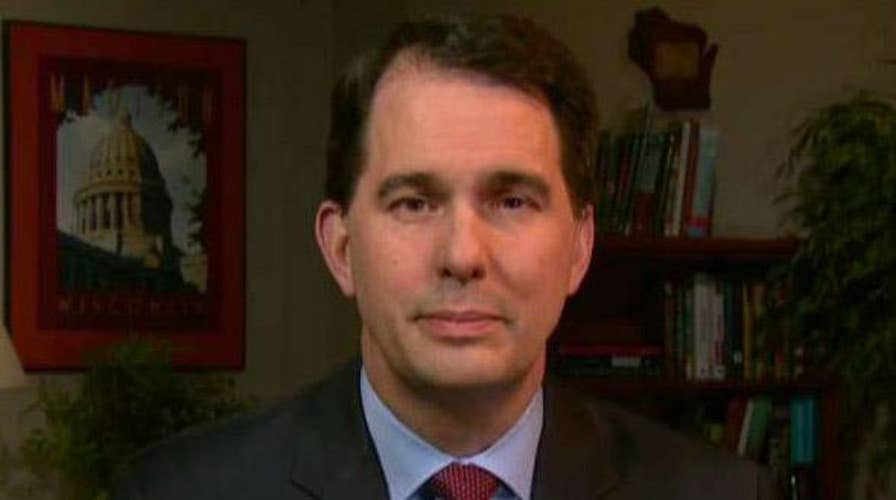Gov. Scott Walker explains his 'blue wave' warning
Republican governor from Wisconsin joins 'The Story' to discuss how concerned Republicans should be about the 2018 midterms.
On paper, Wisconsin Gov. Scott Walker would seem a safe bet to cruise to a third term, with a strong state economy, national profile and streak of three consecutive electoral victories under his belt.
But even the politically resilient governor has warned that 2018 is different – he’s one of the few Republican officials openly warning of a “blue wave” in November. And his race could stand as a major test case for whether a robust Republican can survive the tough national climate.
“Unemployment is lower than the national average, the tax cuts have gone over well, but, he has benefitted in the past when he has had President Obama to run against as a foil,” Barry Burden, a political science professor at the University of Wisconsin, told Fox News.
Burden said Walker has ridden national waves before, winning in 2010 and 2014 (and a recall in between) during “big Republican years.” But the environment is different: “He now faces a potential big Democrat year in 2018. He is good at winning elections, but he has been ringing the bell about a blue wave since January.”
Wisconsin Gubernatorial Race
Republican Gov. Scott Walker has won 3 gubernatorial races in a row.
He's trailing Democrat Tony Evers in most recent polls.
Fox News Power Rankings has moved the race into the 'lean Democrat' column.
This year, Walker is trailing Wisconsin Superintendent of Public Instruction Tony Evers by 7 points in an Ipsos poll and 5 points in a Marquette poll. Meanwhile, Fox News Power Rankings just shifted the race from "tossup" into the "lean Democrat" column. The Cook Political Report and Inside Elections are still describing the race as a tossup.
Also, Burden claimed the incumbent, after eight years in office, is working against “Walker fatigue.” While a third term is somewhat rare, the last GOP governor, Tommy Thompson, was elected to four terms.
The White House dispatched Vice President Pence on Wednesday to help shore up Walker’s bid with a pair of campaign appearances.
And Brian Reisinger, a senior adviser to the Walker campaign, said putting Democrats in charge would reverse important reforms made in Wisconsin.

In this Sept. 28, 2018 photo, Democratic candidate for governor Tony Evers, speaks in Madison, Wis. (AP)
“Scott Walker's bold leadership turned Wisconsin around after years of Democrat mismanagement — resulting in record-low unemployment, higher wages, and historic actual-dollar investments in education, all while cutting taxes,” Reisinger told Fox News. “Tony Evers puts these reforms at risk, and his plans to hike property taxes, income taxes, and gas taxes would have a chilling effect on our economic comeback and take us backward. Wisconsin can't afford Tony Evers.”
The Evers campaign did not respond to phone and email inquiries for this report.
Evers has been the top education official in the state since 2009, which is a nonpartisan elected office. Before that, he was deputy superintendent. He also is a former teacher and is using that background to campaign on increased spending for the state’s schools. Evers' ads have criticized Walker over school funding and resistance to increased Medicaid funding.
“He has a demeanor and an office that doesn’t make him as polarizing as some Democrats,” Burden said, while adding a big question is whether “Walker can build on the coalition that Trump built.”
Two years ago, Donald Trump became the first Republican presidential candidate since Ronald Reagan in 1984 to carry Wisconsin. This election could offer a glimpse into whether the state—which also has a GOP legislature—is shifting from purple to red for the long haul.
Walker, who briefly sought the Republican 2016 presidential nomination, gained national stardom for taking on public employee unions, cutting taxes and holding the line on spending. Because of his reform agenda, he faced fierce pushback, and in the summer of 2012 was the first governor in the nation’s history to survive a recall election—and did so comfortably months before Obama carried the state.
During his tenure, Walker helped strengthen the state GOP, expanding the state legislative majority and flipping two blue congressional districts red. However, in January, a Democrat won a special election for a state Senate seat that the GOP held for 17 years. Then, in April, a liberal judge won a seat on the Wisconsin Supreme Court. This led Walker to warn in a tweet about a “blue wave” fueled by “outside special interest money.”
If there is a blue wave nationally, Wisconsin Republicans typically outperform the national party. In 2016, Sen. Ron Johnson—who like Walker also was running behind his Democratic opponent at this stage in the race—was re-elected running 2.3 points stronger than Trump in the state. In 2012, Democrat Tammy Baldwin won her Senate race running behind President Barack Obama who carried the state that year. Though Republican Thompson lost the race, he still ran ahead of Republican presidential nominee Mitt Romney in the state.
Fred Lucas is the White House correspondent for the Daily Signal.












































